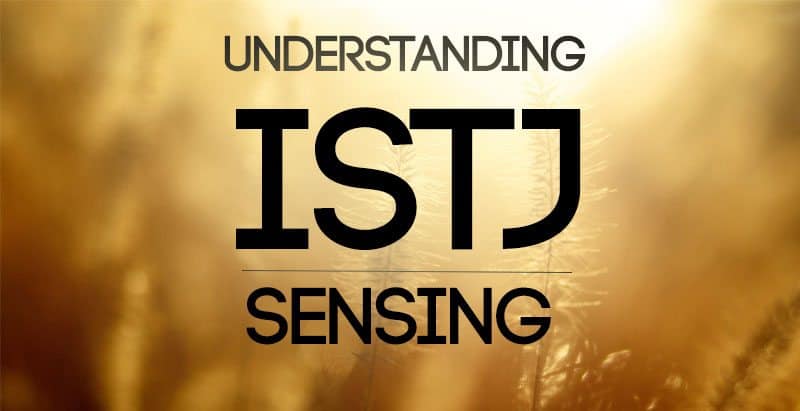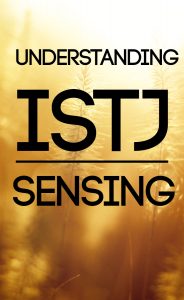Understanding ISTJ Sensing
“The greatest and noblest pleasure which we have in this world is to discover new truths, and the next is to shake off old prejudices.”
– Frederick the Great, an ISTJ
The mind of an ISTJ is a fascinating place; a storehouse of facts, details, and information that can be recalled at a moment’s notice. These masters of memory are simultaneously serious yet remarkably witty; with a dry sense of humor that can keep anyone guessing. They are recognized for their impeccable attention to detail and their ability to get a job done with unbeatable resourcefulness and accuracy. The ISTJs ability to manage resources and money well often makes them successful in the financial and business industries. Warren Buffett, Jeff Bezos (the founder of Amazon), Ingvar Kamprad (the founder of IKEA), and Peter Thiel (the founder of PayPal) were all ISTJs.

“I think frugality drives innovation, just like other constraints do. One of the only ways to get out of a tight box is to invent your way out.”
– Jeff Bezos, an ISTJ
If you know an ISTJ, what you’ll see is their auxiliary function, Extraverted Thinking (Te). This function gives them a firm, objective view on how decisions should be made. They can easily spot problems that need solving and find efficient ways to resolve these problems in a timely manner. They like to have things organized and logically handled, and while they prefer a certain autonomy, they have no problem delegating if it will speed up the process. The ISTJ’s thinking side allows them to remain objective and focused on the facts when a decision needs to be made.
Because ISTJs are introverts, their dominant function, Introverted Sensing (Si) is less obvious. Yet this is the core part of their sense of “self.” It is constantly working in the background and is more accessible to them when they can be alone to process things.
Understanding Introverted Sensing
Introverted Sensing (Si) types have a remarkable ability to retain information and past experiences. They draw on their past experiences, age-old lessons, and trusted resources to make wise decisions for the future. Si also gives ISTJs a unique ability to feel inner-body sensations strongly. ISTJs (and ISFJs) are often highly aware of the tastes and textures of food and can sense nuances in flavor that many other types aren’t aware of. They are also especially aware of feelings like hunger, thirst, fatigue, or illness.
Introverted Sensors like routine and consistency. Dr. A.J. Drenth says in his book My True Type: Clarifying Your Personality Type, Preferences & Functions that “The more times SJs repeat something-eat a certain meal, listen to a specific song, etc,.-the more likable (or tolerable) it becomes.” This is why when you go out to dinner with an ISTJ, they may have a favorite restaurant and a favorite meal that they order time and time again. This isn’t to say that ISTJ’s can’t be adventurous or try new things, they just greatly enjoy the “tried-and-true” and experiences they have positive memories associated with.
ISTJs strive to be dependable people who mean what they say and follow through on it. They are known for their honesty and hard-working nature. While they are noticeably reserved, they have an intense depth of caring for their families and loved ones. In this way they can be a fortress of strength to others; they keep calm during a crisis and use their resourcefulness and experience to find a resolution to problems.
When you speak to an ISTJ, it’s best to stick to the facts. They trust facts, experience, and credentials. They can easily evaluate the details to spot whether something seems credible or untrustworthy. Because ISTJs are sensing-dominant they have a harder time trusting the abstract or “intuitive” possibilities. Johannes Hermanus van der Hoop, a Dutch psychiatrist who studied personality type, said of Si-dominant people that they “cannot take intuition seriously, and they regard its activity in others with misgiving.” He also said, that they have “great capacity for perception of details and for practical evaluations based on them…In their own field these people are usually very much at home, having a good mastery of the technical side of their calling…They accept both what they can and what they cannot do, as simple facts, but they tend on the whole to underestimate themselves.”
Si-users are not impulsive, but careful and frugal in their decisions. They think carefully about their choices, and try to make the most responsible and reasonable decisions. They put a great amount of trust in their past experiences, and the lessons they’ve learned in history. They make lightning-fast connections between what happened in the past and what is likely to happen in the future. Because they trust routine and the past, they can be wary of change. That said, they can be just the people you need to help a company (or person) in a transition. They know how frustrating change can be so they know how to prepare for it, how to plan effectively, and how to ensure everyone is on board and capable of handling the transition without being thrown off guard.
Characteristics of ISTJs
– They are objective and logical.
– They are systematic and thorough.
– They like to complete projects in a sequential order.
– They are hard-working and responsible.
– They are extremely practical and down-to-earth.
– They enjoy routine and knowing what to expect.
– They are excellent at planning and preparing.
– They recall and absorb a great number of facts.
– They are detail-oriented.
– They often have a dry, sarcastic sense of humor.
The Neuroscience of Introverted Sensing
According to Dario Nardi, a UCLA professor and expert in the field of neuroscience, ISTJs (and ISFJs) show brain activity that “reflects their background, training, and job expertise….Si types are stimulated by focusing on activities that correspond to their specific experiences and training.” He goes onto say that they enter a zone-like state when they review past events, especially if they close their eyes and immerse themselves in a memory.
Nardi also says that Si-users are “specialists”. They have an intense focus on a specialized skill or activity and “have a propensity for rote memorization, repetition, and in-depth review of daily events-all habits that help them burn new neural pathways.” ISTJs show high brain activity in areas that help them to consider and plan for the future as well. They may not daydream about the future in an abstract way, but they like to plan for the future in practical, hands-on ways. This is why they are skilled at preparing for a trip, a business meeting, or any tasks or activities in the near future.
You can find out much more about the neuroscience of ISTJs and all the other personality types in Dario Nardi’s book Neuroscience of Personality: Brain Savvy Insights for All Types of People.
ISTJs, Memory, and Imagery
ISTJs tend to have a very visual memory. They often think in terms of mechanical images and as a result, are drawn to the fields of mechanics and engineering. They can easily recall in their mind how things are built, constructed, and maintained. ISTJs who have developed especially masterful use of Si can have a nearly “photographic” memory, easily recalling dates, phone numbers, and huge amounts of technical data.
Now if you’re an ISTJ with an average memory, don’t worry. There are plenty of ISTJs who have average memory recall because they’ve had to focus more on their auxiliary process, Extraverted Thinking. ISTJs who spend much of their time around others will naturally use their extroverted function more. While Si will still remain the dominant function, they may not have the mastery of it that someone with more alone time would. That said, their thinking process might be more advanced than a typical ISTJ’s would be.
The objects of the ISTJs memory may differ from person to person as well. Some ISTJs will be better at recognizing faces and symbols over dates and phone numbers. But generally speaking, ISTJs (and ISFJs) are going to be much better at recalling information from the past if they are allowed to utilize their Si to its full extent. They can fully encounter the power of Si by allowing themselves quiet time alone to immerse themselves in their memories and past experiences. Si-users tend to especially enjoy watching old “home movies”, listening to music they once loved or looking at photographs that bring them back to an experience they loved in the past. Exercises like tai chi and yoga can also help the ISTJ to get further in touch with his or her body and internal sensations. This is a great way for them to de-stress, calm, and get into a mental “zone” that is quite gratifying as it fully utilizes all of Si’s abilities.
Fun Facts About ISTJs:
These facts are taken from the MBTI® Manual – Third Edition.
– ISTJs are one of the top two types among industrial/technical teachers.
– ISTJs prefer the academic subjects of math and practical skills.
– According to a national sample, the favorite leisure activity for ISTJs was “Watching sporting events”.
– ISTJs are overrepresented among bank officers and financial managers.
– ISTJs are overrepresented among both male and female small business owners.
All About ISTJs
Any Questions?
Find out more about your personality type in our eBooks, Discovering You: Unlocking the Power of Personality Type or The INFJ – Understanding the Mystic. You can also connect with me via Facebook, Instagram, or Twitter!
Sources:
Want to know more about ISTJs? Check out these amazing books!
Gifts Differing: Understanding Personality Type
MBTI Manual: A Guide to the Development and Use of the Myers-Briggs Type Indicator, 3rd Edition
Neuroscience of Personality: Brain Savvy Insights for All Types of People
Creative You: Using Your Personality Type to Thrive
My True Type: Clarifying Your Personality Type, Preferences & Functions













Great article Susan. I’ll be on the lookout to see if i know any in my area.Si is somethjing i have developed a little over the past few years,by visualizing moments.
Thank you! I’m so glad you enjoyed it 🙂
As an ISTJ, I can say this article describes me to a T. Very well written. There are a few resources I’ve bookmarked for future reference and this has easily become one of them.
So many of you observations are true for me! The major difference here is that I have no clue in math or engineering. But one of my brothers who I strongly suspect is also an ISTJ is a great civil engineer. Thanks for your fascinating articles!
Hi, Susan! Your article describes me, totally! I go to a naturalist who always tells me to connect my mind, body, and spirit. She’s been telling me this for two years. I still don’t know what she means or how to do it. I’m an ISTJ and I find the concept frustrating. I have done so much research searching for the answer. A friend suggested I determine how I “hear” spirit. I don’t “get” that either. I’m wondering if you could point me in the right direction to understanding the mind, body, spirit connection and how to achieve it for an ISTJ? Thanks! -Nancy
Hi Nancy! I hope you don’t mind, but would you be able to clarify what you’re hoping for better? Are you looking for a way to get more in touch with the mind/body/spirit or am I misunderstanding? Sorry to be a little slow, just want to make sure I know what you’re asking 🙂 Thank you!